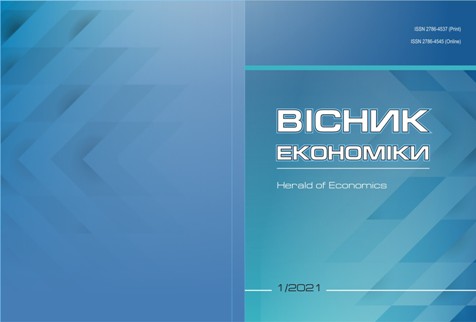Key areas of improvement of tax administration in the Republic of Kazakhstan
DOI:
https://doi.org/10.35774/visnyk2023.01.109Keywords:
tax administration, budget planning, sustainable development, performance audit, tax audits.Abstract
Introduction. The rapid dynamics of global processes leads to the economic activity of the countries of the world and the increasing degree of openness of their economies. Global processes taking place in one region of the world have a direct reflection and influence on the processes taking place in other parts of the world. The Republic of Kazakhstan is not without exception, whose economy is characterized by openness, and at the same time can be vulnerable to changes in the ratio and forces of influence on the national economy from external and internal factors, contributing to economic growth or its decline.
Target. The purpose of the article is to form conclusions based on the analysis of the effectiveness of tax audits over the past 5 years.
Research methods. The study was based on a systematic analysis, solving specific problems was achieved through comparative, statistical and graphical analysis.
Results. The results of the analysis of the effectiveness of tax audits over the past 5 years show a decrease in the quality of audits due to the imperfection of the regulatory framework, the level of training of qualified personnel of tax authorities.
Perspectives. The issue of deviations in “mirror” statistics with the PRC, where there remains a significant discrepancy, also remains relevant now. January 11, 2022 the President of Kazakhstan at a meeting of the Majilis of Parliament criticized the work of customs authorities in this direction. The head of state drew attention to the discrepancies in the “mirror” statistics with the customs authorities of China and the work of authorized operators, which have the status of “untouchable”.
References
Taufik Kurniawan (2018). Modernization of the Tax Administration System: A Theoretical Review of Improving Tax Capacity. E3S Web of Conferences 73. Retrieved from: https://doi.org/10.1051/e3sconf/201873 ICENIS 2018 [in English].
Jenkins, G. P. (1992). Economic Reform and Institutional Innovation, Bulletin International Bureau of Fiscal Documentation, December 1992: 588-596 [in English].
Quintana, F. (1994). The Organization of Tax Administration in the CIAT Members Countries. CIAT Review in 1985-1986. Technical Publication of the Inter-American Centre of Tax Administrators, in Jenkins [in English].
Modernization of Tax Administrations: Revenue Boards and Privatization as Instrument for Change (1994). Bulletin International Bureau of Fiscal Documentation, February 1994:75-81 [in English].
Sudiarta, I. N. (2017). Panama Papers dan Praktik Penghindaran Pajak. Retrieved from: https://www.cnnindonesia.com [in English].
Zain, M. (2003). Manajemen Perpajakan. Jakarta, Salemba Empat.
Nasucha, V. (2004). Reformasi Administrasi Publik: Teori dan Praktik, Jakarta, PT Gramedia Widiasarana Indonesia [in English].
Emran, M. S. & Stiglitz, J. E. On Selective Indirect Tax Reform In Developing Countries. Journal of Public Economics, 89 (4), 599-623 [in English].
Candra, R. & Wibisono, H. (2013). Modernists Sistem Administrasi Perpajakan & Kepatuhan Wajib Pajak. Jurnal Riset Manajemen & Akuntansi, 1 (1), 1-9 [in English].
Doni, P. G. (2015). Upaya Modernisasi Sistem Administrasi Perpajakan Terhadap Kepatuhan Wajib Pajak (“Studi Kasus Pada Kpp Pratama Semarang Timur, Skripsi”, Fakultas Ekonomi & Bisnis Undip) [in English].
Rochmah, A. (2015). Pengaruh Penerapan Sistem Administrasi Perpajakan Modern Terhadap Kepatuhan Wajib Pajak. Jurnal Ilmu dan Riset Akuntansi, 3 (10) [in English].
Listriana, L. (2016). Pengaruh Penerapan Sistem Administrasi Perpajakan Terhadap Kepatuhan Wajib Pajak. Jurnal Ilmu dan Riset Akuntansi, 3 (2) [in English].
Arifin, F. (2016). Pengaruh Modernisasi Sistem Administrasi Perpajakan, Kesadaran Perpajakan, Sanksi Pajak Dan Pelayanan Fiskus Terhadap Kepatuhan Wajib Pajak Orang Pribadi. Perbanas Review, 1 (01) [in English].
En, S., Setiana, T. K. & Agustina, L. (2011). Pengaruh Penerapan Sistem Administrasi Perpajakan Modern Terhadap Kepatuhan Wajib Pajak. Jurnal Akuntansi, 2 (2), 134 [in English].
Website of the Bureau of National Statistics. Retrieved from: https://www.gov.kz/ memleket/entities/stat?lang=en&ysclid=lcvorb53kb180113952 [in Kazakh].
The report of the counting committee to the government’s reports on the execution of the republican budget [in Kazakh].
Website of the Ministry of Finance. Retrieved from: https://www.gov.kz/memleket/ entities/minfin/about?lang=en [in Kazakh].
Website of the State Revenue Committee. Retrieved from: https://www.gov.kz/ memleket/entities/kgd?lang=en&ysclid=lcvomdpnqi548313075 [in Kazakh].






